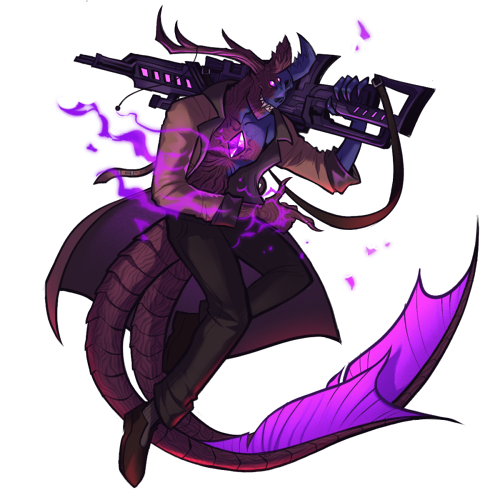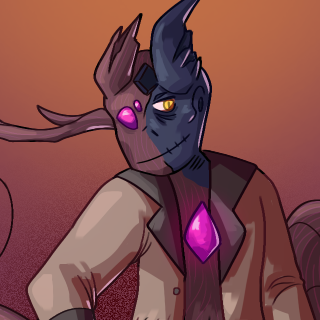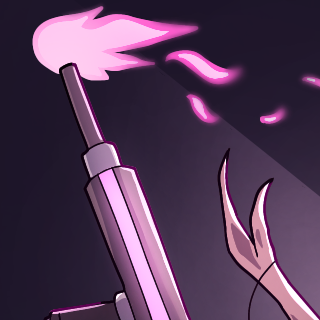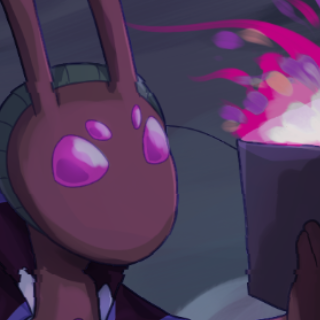[Cosmosdex] The Universal Encyclopedia
[Cosmosdex]
Ghep
Exalted's Undeath / Spooky Manager
Ghep

Art by, frog
- Strength-4
- Intelligence-10
- Charisma-1
- Endurance-7
- Agility-9
- Luck-5
Age: Unknown
Size: 7.4 ft tall
Species: Craheii/Risen Uutzi
Job: Manager, Necromancer
Likes: His cult, Science, High-quality pens, Guns, High-gen AIs
Dislikes: Mindless abominations, His budget, Limbo gods, Interlopers
Notable contributions: Owner of a cargo company and scientist working towards "modern" necromancy.
Traits
This character has a humorous personality and likes to joke and play around with others. In most cases their japes are harmless, though they are not necessarily funny and can really try the patience of those less easily amused.
This character is able to easily come up with new ideas and may be able to lessen the cost for current items. In a tough situation this character is likely able to use simple items to create make-shift weapons or items.
This character notices things far quicker than most other types of characters. They are more likely to make observations about hidden passageways or certain special objects. They overall make better judgements than others.
This character is a disciplined fighter and is skilled in the operation of all manners of combat equipment, weapons, and armours. They have killed before, and will suffer no morale or sanity loss from witnessing death.
This character cares very little about issues relating to anyone but them. They may make very insensitive comments towards people and voice how much they wish other characters would "get over it."
This character has a specific part of their body that is easily distinguishable, ie a discolored patch of fur, a large gap in a character's armor/carapace, or an exposed organ. When this body part is struck by an attack, that attack will be treated as if the character had 0 Endurance.
This character commonly puts anyone around them on edge by presence alone. Everyday they are with someone, the sanity of the person goes slightly down.
This character is armed to the teeth and as such is never without a weapon. If you don't equip a weapon to this character and they need to fight, they will pull out a random weapon that they "happened" to have on them that was never mentioned until now. How good the weapon is depends on a roll.
Original Creator: Chimerii
Physical Description
Ghep is readily apparent as a person who is not a hybrid, but instead, two people at once, characterized by his split face and the roots of his craheii self having overgrown more than half of his uutzi self. A fusion, two consciousnesses exist in one body due to a craheii gem trying to overtake a Risen uutzi, someone who naturally managed to be near-functionally dead without being, in truthfulness, dead.
He is, by many qualities, a regular uutzi, having retained the body type of one. However, the right side of his face, his right arm, and most of his chest look positively craheii-ish and are covered in pinkish brown roots inlaid with brighter pink streaks. The roots covering his face look almost parasitic, having overgrown the diamond-shaped trepanation hole on his forehead, as well as one of his nostrils, earholes, and cracked horns. An antler grows out from where the earhole should be, slightly deformed in that it does not grow vertically before turning at a right angle as most craheii antlers do. Additionally, he has two tails with stingers on the end, typical of most craheiis.
Despite the overgrowth, the roots are mostly harmless and hardly affect a person who rarely needs to breathe and has sharp hearing regardless of the fact that he only has one ear. Noticeably, the roots also affect his ability to emote, and he cannot open the craheii side of his mouth as wide as the other side. His old eye was also overgrown, being replaced by one magenta eye and a smaller, vestigial one of the same single color, and these eyes also cannot emote as well as the other side of his face.
Ghep wears a long, tan coat with dark cuffs that he keeps open most of the time, exposing the magenta-with-golden-runes craheii gem in the center of his chest. If shattered, it would destroy the craheii side of his consciousness and render him mostly paralyzed on the right side of his body, so he tries to keep it well-protected despite its blatant weakness. He wears dark grey pants and maroon work shoes.
His cryokinetic powers are fairly limited for a Risen uutzi and always have been. He can drop the temperature easily and can, at most, cover items close to his un-overgrown hand with a thin film of ice.
Personality
First impressions would characterize Ghep as a morbid, insensitive jokester whose jokes only serve to intimidate. The unfortunate people who have met him and described him in such a way would be largely correct. While there is a small sect of people who would describe him as caring, all-knowing, and godlike, the only truth to what those people believe is that Ghep does perceive his actions as messianistic at times.
Under the guise of running a seemingly innocuous cargo company named Sylvastia, Ghep uses it as a front to deliver items of varying legality to his secluded, underground home base. Among these items are sagittari arrows, Helmutziian soil, mutagen-filled pesticide, and other things associated with undeath- all for a scientific, stable, more "modern" method of necromancy, as he calls it. Blessed items of Limbo are forsaken for what he strives to create, through careful, strenuous experimentation, a way to quickly and safely revive others without the help of (another) god's hand.
While Ghep does not see himself on the same plane as the powerful Limbo gods, who he regards with skepticism at best, he often spouts phrases of a religious fervor as he portrays himself as, at times, a holy savior who will let people freely and peacefully walk on the same line between life and death as he naturally does. This complex is mostly hidden, as even he understands that a new religion of sorts is hard to indoctrinate one into, but words do slip. He does, however, fully express and encourage the god complex from his loyal wozzee followers who wholeheartedly see him as God, and slips lies to the exalted of their ranks that they are the personal emissaries of God's mission. They believe that they are creating a utopian society of wozzees where ancestors can live peacefully among the young.
With the exception of partially-sentient-at-best undead abominations at his lab as company, Ghep runs an entire wozzee city as experimentation fodder, their seclusion leading to the delusions that their owner was a kind and merciful god, something that the heartless necromancer let get to his head. Despite the ominous atmosphere of the rest of his lab, the wozzee city has been kept fairly pleasant from the start, and Ghep has allowed the wozzees living there to develop their own isolated culture in an acceptably peaceful and suburban environment.
Most notably, aside from the wozzees' religion, is that Ghep occasionally accepts the brightest and most pious of the city's citizens, honorably dubbed "the exalted", to serve alongside him as both assistants, and, when the time comes, test subjects for necromancy. The exalted are sacrificed willingly, well aware of what they are getting themselves into, and eager to help out their god's cause anyway. Although most are overjoyed to be exalted, many hold doubts about being forced to permanently abandon their hometown in the process, a hesitation that Ghep quickly teaches them to ignore. The exalted often reason that the exclusive honor of getting to meet God and work alongside him is more important than their life back home.
Despite having a whole city to gain test subjects from, Ghep only practices experimentation on the exalted to uphold the other wozzees' belief that he is kind, and that the intellect of the exalted would hopefully make them more resistant to the usual mind-degrading effects of necromancy. When not being used as test subjects, Ghep usually outfits the exalted with communication devices to serve as watchbugs for abominations and intruders, plus an extra set of minds to work towards his scientific endeavors.
The irony of being a fusion, not unlike many abominations of old, is not lost on the manager, and this reflects in some of his scientific practices. While he mostly brings people back to life with the intention of keeping them just as they were, the bodies he obtains that happen to be indistinguishable from others that came with it are used as excuses to experiment on creating abominations made from fused beings. While Ghep sees his combined existence as an overall positive, fused abominations are not his focus in his studies, though he doesn't mind creating them when particularly convenient. His opinion of them is a faint sense of familiarity, though ultimately disgust and apathy once he learns of their flaws from yet another experiment that didn't end in perfection, or at least something close to it. Though it's not to say that he becomes overly frustrated each time an experiment fails- all advancements are to be celebrated, at least a little bit.
When he's not raising the dead or playing god, Ghep gains the money for his lab through Sylvastia, the cargo company which appears normal, if not suffering from a few cut corners in safety regulations, to any onlooker. Most crewmembers are hired as normal employees and never do anything even unknowingly illegal. Despite not actively assisting towards necromancy, they provide Ghep's income and he sees them as immensely helpful, if not easy to exploit. However, Ghep occasionally hires those especially desperate for money with the promise of a large payload after they deliver items to him and his lab personally. These doomed crews, after delivering illegal items such as pure mutagens or dust from Helmutzi, are mercilessly killed by the necromancer for extra test subjects. The empty ships are then sent back into space by crews of the exalted and high-gen AIs to hire more desperate crewmembers and repeat the cycle.
He's well aware that his actions are heartless. But, the irreversible lack of empathy ingrained into him and the honest belief that he is working towards the greater good lead him not to care. All non-hostile abominations are to be poked, prodded, and experimented on, and those that get revived as mindless, murderous monsters (which happens more often than not) are brought back to death with a swift pull of a trigger from one of his numerous large guns. The exalted and most employees of Sylvastia are the only ones he treats with some form of genuine kindness, yet that can dissolve in seconds if he sees it necessary.
Ghep carries a faux friendly demeanor with him at most times. He speaks with a highly casual tone and enjoys joking with others, even right before (and after) he kills them. He'll tell tales that he heard from others and (usually fabricated) tales about himself, meant to entertain both speaker and listener and to fill up an empty room. Naturally for a murderer, however, his tone can switch to icy and serious in an instant, particularly when upset about his usually massive workload or threatening a person who needs to be put in their place. Murder is, to him, about as consequential as stamping out a pesky bug he happened to find crawling across his desk. A less hostile, but still serious demeanor is also extended to him when he's carefully and meticulously messing with the bulky, industrial equipment that makes his "modern necromancy" work, many of the machines having been at least partially designed by himself.
Ghep is hardly a public figure, being stranded in his labs since leaving would likely quickly get him captured by numerous law enforcement organizations. He doesn't entirely mind this, as he describes his industrial home as "a bit on the ominous side, but trust me, it's endearing in a sorta way," not to mention that it's the product of hundreds of years of dedicated work. Any Sylvastia employees that he contacts know only his voice through phone calls- otherwise, he is an isolated figure.
While the two consciousnesses inside his head work as one being most of the time, particular physical or mental stress can cause them to split. The craheii side of his consciousness can be described as cheerfully morbid and the uutzi side as dark and openly ruthless, speaking with clearly-defined accents when separated. When as one, the quirks show themselves to a lesser degree, such as occasionally forgetting sentence particles or using the word "kihha" as a curse.
Although heartless and remorseless about killing, Ghep is admittedly dedicated to his job. He's often extremely busy filing paperwork and running experiments (while unhesitantly destroying the paperwork he deems unimportant) and lives by a tight, self-set work schedule. Free time is frequently spent browsing his work and occasionally harassing the abominations kept behind bars. Ghep, thanks to his unique physiology, lives in relative happiness between life and death, and if he can, he doesn't see any reason why he can't make it the same for others through necromancy. Showing kindness to the living and those he brings back to life is only a second thought in the grand scale of undeath.
History
Outside of Serenity, the Risen base of operations, Ghep was a nameless, valiant, and loyal soldier who stumbled upon an item, a mysterious magenta gemstone, recently obtained from the rebels after a hard-fought battle- yet one the uutzi had managed to push through unscathed, despite massive injuries and casualties dealt to his own faction. More seeing it as a fancy trinket than a good luck charm (though the sentiment was still there), the soldier pocketed the gem and kept it close to his uniform as he and his fellow Risen prepared to travel back to their base.
Surprise was enacted from the soldier as he found that the gem had started bonding to his chest in the following days, impossible to safely remove, and with it came another voice in his head.
The soldier, having since returned to Serenity and trying to continue his work without interruption, quickly learned more about the consciousness he now shared his head with, and the voice learned about him. The craheii, as the soldier learned his species was, was nameless, too. After having outworn his original kitsche corpse, the gem rotted away from the body and was unable to find a new one for several years. The craheii's recollections of the event are extremely vague, but he bests describes it as an event that could have taken mere weeks to millennia, the end result being that he was put in the hands of Helmutziian rebel thousands of light years from his original position of Planes-Umbra, then taken in the hands of the nameless Risen soldier. The craheii, in turn, learned of the soldier's work of killing rebels and reviving their corpses into uutzi converts.
The soldier explained that he wished there was a way to quickly and properly revive the people while keeping their memories intact, in order to skip the usual troubles of having to let the converts relearn things, and because he found it shameful that they would have to forget their original identity. The craheii, an apparent scholar, explained that the answer would be necromancy, and that he had learned its secrets from invading the personal belongings of the original kitsche whose corpse he inhabited. Reading such texts had made the scholar, unlike most of his kind, supportive of necromancy and eager to help the soldier if that was the path he decided to take.
The soldier decided that necromancy was the most logical course of action. Free time was spent in a small, hidden base outside of Serenity, developing machines to "properly" raise the dead, as the two, slowly-merging consciousnesses called it. Unable to gather all the traditional items and methods involved in necromancy, and the soldier having little desire to touch Limbo items due to his atheism, they instead combined other parts of it with the "necromancy" used in reviving corpses into uutzi converts. The scholar gave necromancy advice while the soldier provided technological know-how. The work eventually culminated in stealing Risen supplies and rebel corpses to test on their prototype machine, the first of "modern necromancy," each use resulting in mindless abominations, not bothering the now-fusion at all.
Eventually the Risen government caught onto the soldier and the scholar's, now having fused into the scientist's, experimentations, having grown suspicious of him for the root-like growths along his body, the radical change in personality, and the disappearance of valuable supplies. They discovered the necromancy machine the scientist had crafted, and long-ensuing drama and punishments culminated in the scientist being banned from Helmutzi.
Needing a solid identity, the scientist dubbed himself Ghep and got to work. Having learned his lesson, he realized he would need better resources before he could reliably practice necromancy and not get caught. Years spent as a menial office worker and a person serving other odd jobs eventually culminated in him gathering the money to purchase an abandoned, underground laboratory on a nondescript planet and a small cargo company.
As Ghep moved to the lab, renovating it and finally resuming his necromancy, he managed the cargo company, Sylvastia, into a much larger business and more reliable source of money. However, whispers of his crimes had grown, and he was forced to remain at his well-hidden lab to avoid capture while Sylvastia remained his sole lifeline to the rest of the universe.
Eventually Ghep purchased his own, personal wozzee city, hoping it would provide him with a more stable and covert source of necromancy test subjects. Inadvertently, without his direction, the wozzees had formed a religion around him, something that the necromancer grew to enjoy and encourage.
The use of the exalted wozzees, plus countless more test subjects and years of experimentation has culminated into Ghep being able to reliably revive the dead and have them keep a solid physical form, though their mental states remain highly unstable at best. So long as he remains uncaptured and Sylvastia remains intact, he hopes to continue his experiments to perfect his goals.
Special
Fusion: Ghep is the combination, both physically and mentally, of a craheii and a Risen uutzi. Despite calling himself a singular person, he has the history and knowledge of two separate people. These consciousnesses are near fully intertwined, but physical and mental stress can cause them to start separating for its duration.
Trivia
• Ghep's affinity for high-gen AIs comes from their versatility in the labs and their blind obedience to commands. While most work without problems, the few defective ones are either thrown out without a second thought or used as toys for the more childish abominations.
• Despite being banned from Helmutzi, the numerous cargo crews Ghep sends there to gather its dust and soil are often given the extra task to gain the local news between Cavity and Serenity and return it to their manager. He still retains a number of Risen beliefs and items from Serenity, including his old uniform.
• The wozzee city's official name is Ophir. Despite this, no wozzee but the exalted know its true name, all living there knowing it as simply "the city", with most exalted and their manager also referring to it as such. The labs themselves are known as Sylvastion Labs, but both Ghep and the exalted refer to it as merely "the labs" in a similar fashion.
• Many of the weapons Ghep wields are surprisingly lightweight despite their looks. Often times he has personally modified them to be so while retaining full or high functionality in order to make them easier to use.
• Ghep strictly refers to himself with singular pronouns but will occasionally treat himself as being nameless, only referring to himself as "the manager" at times.



